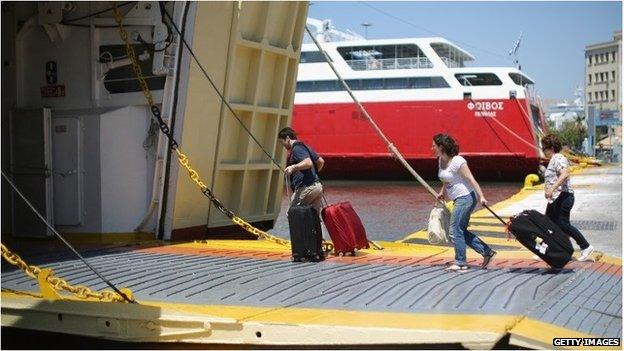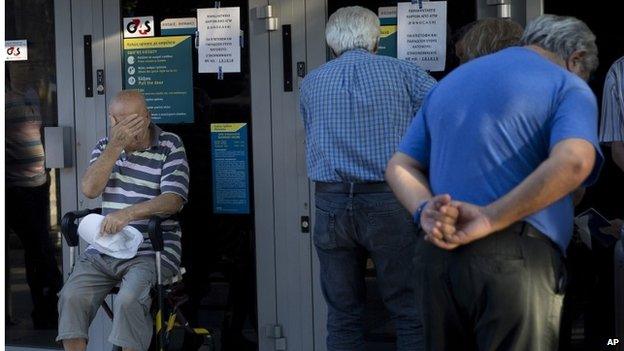Greece: Selling off the silver
- Published

Plans to sell the Port of Piraeus are already well advanced
Greece has agreed to the creation of a new independent fund that will manage assets to privatise.
The target is to generate a total of €50bn (£35.5bn, $55bn).
But the cash won't come quickly. The aim is to generate that kind of money over the "life of the new loan".
We haven't been told how long that will be - that will be part of the detailed negotiations that the summit agreed to launch.
But it is likely to be several decades. The final payment under the second bailout is due in 2054. Bailout number three, if it does happen, is also likely to have a long repayment period.
Efficiency
Privatisation has been an element in the Greek bailouts from the beginning, when the first one was agreed back in 2010.
There were two reasons why the lenders - the eurozone and the IMF - were keen to include sales of state owned assets. One was to improve economic efficiency.
The IMF put it like this , externalin a review of the Greek programme in 2011: "The asset transfer [in other words privatisation] would create a basis for new investment and growth; indeed the state enterprises involved already represent about 15% of total Greek investment and 2-3% of value added, and new owners would have an incentive to make them more productive."
Deja vu
The other consideration was to raise money to ease the financial strains on the Greek public sector.
If you have a feeling that you might have heard that €50bn figure before in this context, you are right. Back in 2011, that was the target for privatisation receipts- an objective to be achieved by the end of 2015.
It won't be. Even then, in 2011, the IMF described the target as ambitious.
More recently , external(about a year ago when the IMF last completed a review of the Greek programme) the assessment was: "performance on privatisation continues to fall short of expectations".
Underlining the judgement, in that review the IMF projected total privatisation receipts of €22.4bn, less than half the earlier figure and by the much later date of 2022.
Frustration
The latest incarnation of a privatisation plan envisaged by the eurozone leaders in their post-summit statement , externalreinstates the €50bn target.
But it is even further into the future.
It also plans a new agency. Greece does already have one - the Hellenic Asset Development Fund.
The desire for a replacement reflects eurozone frustration with the missed targets. Originally, the eurozone were seeking an agency based outside Greece.
But they gave ground on that and have accepted that the fund will be based in Greece and managed by the Greek authorities but "under the supervision of the relevant European Institutions".

Could stakes in Greece's banks eventually be on sale to the public?
Not attractive
Greece does have things it can sell. There are businesses. Plans to sell airports in the islands and the Port of Piraeus are already well advanced and there are other infrastructure operations that could be sold.
Eventually, there could be an opportunity to sell public stakes in the banks. But they are likely to receive further injections of capital as part of the next bailout, so the short term prospect is for increased public ownership.
Significant money
The current weakness of the Greek economy is bound to affect their borrowers' ability to repay. It will be a long time before they are attractive to investors.
There is also a large portfolio of properties - 70,000 according to the IMF.
But information about them is out of date, and many have contested ownership or illegal occupants.
A great deal of preparatory work is needed to make them ready for sale, but they could in theory yield significant amounts of money.
They include sites that have strong potential for tourist development.
So, let's suppose the money does eventually come into this new fund. It will be used to repay the eurozone money used to prop up the banks.
Some will go towards reducing the government's debt burden and some will, according to the eurozone summit statement, be used for (unspecified) investment.